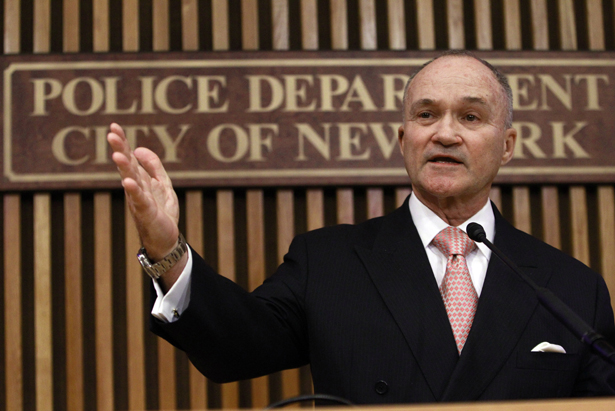
New York Police Commissioner Ray Kelly. (AP Photo/Frank Franklin II)
On October 8, TheNation.com posted a video capturing rare audio of a stop-and-frisk being carried out by the New York Police Department. The surreptitious cellphone recording starts with an East Harlem teenager named Alvin asking plainclothes officers why he’s being stopped for the second time in a matter of blocks. They say he looks suspicious, then, when pressed, unleash a torrent of profanity, demanding to know who he thinks he’s talking to and threatening to jail him.
“For being a fucking mutt” is the response when he asks on what grounds he’d be arrested. Putting him in a hold, a sergeant threatens to break his arm and punch him in the face. They call him a “piece of shit.” At one point they even sneer contemptuously at the mention of Alvin’s father, a “traffic cop.”
It’s hard to say what’s most shocking: the belligerence, the casual authoritarianism, the racism. But this was no isolated incident. The NYPD says it conducts more than 1,800 stops a day; last year there were 685,724 recorded stop-and-frisks, based on such absurdly defined behavior as a person’s “furtive movement.” Those who routinely experience stop-and-frisks, overwhelmingly young men of color, often describe unnecessary force.
Alvin recorded the incident in June 2011. “I was getting stopped a lot, and I didn’t have evidence of cops being disrespectful,” he says. Since then, facing a class-action lawsuit alleging similar tactics, Police Commissioner Ray Kelly claims to have addressed the matter internally, sending a letter to City Council speaker—and likely mayoral candidate—Christine Quinn detailing measures to “increase public confidence” in the stop-and-frisk program. These include recycling a directive against racial profiling and “a new procedure” that will ensure “a greater level of scrutiny of [stop-and-frisk] at the local command level.”
But the command level is precisely where the problem lies. The Nation video, produced by journalists Ross Tuttle and Erin Schneider, features interviews with two anonymous police officers from different precincts who describe how superiors push arbitrary and discriminatory stops in order to meet quotas. “If you’re a certain ethnicity standing on the corner, lieutenants, sergeants—they have no problem searching you, violating your rights, and racial profiling,” says one. Worse, police will deliberately provoke people to give themselves an excuse to make an arrest.
“The civilian population, they’re being hunted,” says one officer. “Instead of being protected by us, they’re being hunted—and we’re being hated.”
That police themselves feel like predators targeting youth of color is a chilling indictment of what the NYPD has become. It helps explain such recent outrages as the handcuffing of Alexis Sumpter on a Harlem subway platform by plainclothes NYPD officers who refused to believe her student MetroCard was valid. She was on her way to a summer internship when they “grabbed me by my arms and flung me up the stairs,” as she told a reporter. “I kept saying, ‘I’m only 15—why are you guys doing this?’ They said they didn’t owe me an explanation.” It also helps explain the February killing of 18-year-old Ramarley Graham, followed into his Bronx home on suspicion of selling marijuana by a police officer who would later claim he had “no choice” but to shoot him. Such tragedies are the result of a collective dehumanization of communities of color, a process rendered largely invisible to white New Yorkers by gentrification and perpetuated by an unrelenting “war on drugs” waged on similar communities across the country.
At a meeting on October 10, New York City Councilwoman Melissa Mark-Viverito, who represents Alvin’s district, was one of several people who brought up the Nation video, saying it “brings to life the arguments the community and the council have been making.” Council members were discussing the Community Safety Act, a series of bills seeking accountability for the NYPD, including a proposal to establish an inspector general to oversee the police force. In an editorial the next day, The New York Times endorsed the idea. “Because the inspector would have subpoena power,” the editors wrote, “the police department could no longer just say no when asked to produce information.”
Mayor Michael Bloomberg, who spent the summer defending the stop-and-frisk program, including at black churches, has responded with hostility, snapping at one reporter that it’s a fine idea “if you want to bring crime back.”
“The last thing we need is some politician or judge getting involved with setting policy, because you won’t be safe anymore,” the mayor said. “Think about that when you write your story.”
New Yorkers know better than to fall for this fearmongering—and the video tells the true story. As one local defense attorney wrote, it “needs to be seen by as many people as possible if there is to be an appreciation of just how wrong things can get when we trade off the appearance of safety for constitutional rights.”
Click here to watch the full video revealing an abusive stop-and-frisk in action.
![]() TAKE ACTION: Stop Stop-and-Frisk
TAKE ACTION: Stop Stop-and-Frisk


